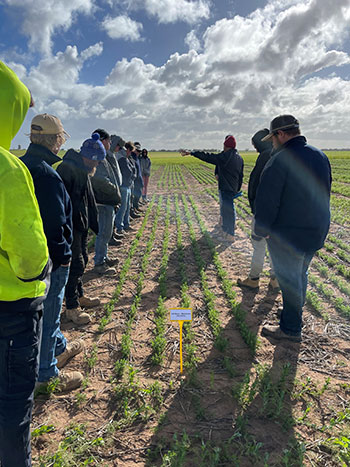Incorporating lentils into a farming system can raise new challenges for growers in areas where they were not grown in the past. In the upper Eyre Peninsula, these are being addressed through a local National Grower Network project
Lentils are a relatively new crop in the upper Eyre Peninsula of South Australia. Discussions held through the National Grower Network (NGN) in 2022 identified a need for more learning opportunities around seasonal agronomic decision-making for the legume component of crop rotations.
In 2023 a new GRDC project was launched, led by Amanda Cook and Nicole Baty at the South Australian Research and Development Institute (SARDI), based at the Minnipa Agricultural Centre. This built on the success of past Pulse Check investments (UOA2303-007RTX).
The project has two components:
- Lentil Check groups – the establishment of peer-to-peer learning groups that have involved 147 growers and 16 advisers; and
- herbicide trials – a herbicide matrix experiment at two sites on the upper Eyre Peninsula to evaluate the profitability of different herbicide-based weed control strategies, including demonstrating newly available herbicide technologies, with consideration to the level of efficacy achieved and lentil crop safety.
Lentil discussion groups
The NGN project established four Lentil Check Grower Groups based at Kimba, Lock, Mudamuckla and Minnipa. Local agronomists, consultants and grower experts were engaged to identify key topics for discussion and facilitate peer-to-peer learning.
 The Mudamuckla Lentil Check Grower Group. Photo: PIRSA
The Mudamuckla Lentil Check Grower Group. Photo: PIRSA
Two meetings were scheduled for each location annually, with the meetings held in March/April and June/July to coincide with critical seasonal decision points.
The pre-seeding meetings had five key topics:
- herbicide safety, especially regarding lentils’ sensitivity to residue from prior weed management strategies, and effective broadleaf weed management strategies in lentils grown in low-rainfall areas.
- crop nutrition;
- seed preparation, treatment and inoculation;
- paddock selection and preparation; and
- seed quality.
The post-crop emergence meetings included visits to growers’ paddocks and had six key topics:
- applying in-crop herbicides;
- detecting fungal diseases;
- preventive fungicide application;
- weed control evaluation and timing of herbicide spray applications;
- salvage options for difficult seasons; and
- optimising nitrogen fixing through assessment of root nodulation.
An additional third session in 2023 involved a field trip to GRDC’s Eyre Peninsula Pulse Field Day.
Bates Agricultural Consulting facilitated the meetings. Other agronomists also attended and promoted group activities including West Coast Ag (the Mudamuckla and Minnipa groups), Nutrien Ag Solutions (Minnipa), James Cant (Kimba), Mudabie (Mudamuckla) and Elders (Mudamuckla).
Growers from across the Eyre Peninsula attended the annual Minnipa Agricultural Centre field days on 13 September 2023 and 11 September 2024 to visit the lentil experimental site and to hear first-hand about the research results.
GRDC grower relations manager Courtney Ramsey says it is always better to learn from the mistakes of others than your own if you can. “Growers in these groups have been great in openly sharing not just their successes but also their muck-ups.”
Experience sharing
Particularly valuable has been the sharing of experiences around herbicide residues in circumstances where there was not enough soil moisture and time for breakdown, which can result in crop damage.
“The forums also explored how people have dealt with pre and post-farmgate issues around things like supply – and how to pivot when something unexpected happens in the season,” Ms Ramsey says.
Project team members were pleased to see so many first-time lentil growers participating in the groups and learning not only from industry experts but also from other growers with more experience under their belts.
“It’s encouraging to listen to the conversations of growers who participated and hear the growth in confidence in growing lentils,” Ms Ramsey says.
In 2023, the yields achieved in a very dry season – in an area which has previously been considered not suitable for lentil production – has been absolutely outstanding.
An article detailing experimental results was published in the Eyre Peninsula Farming Systems Summary 2023 compiled by SARDI Minnipa Agricultural Centre and the results will also be uploaded to the GRDC Online Farm Trials portal.
An evaluation is being undertaken of grower learnings and satisfaction with the program with the aim to shape and fine-tune potential new activities.
Weed control field trials
During 2023 and 2024, field experiments were conducted to evaluate the profitability of various herbicide options for broadleaf weed control in lentils at two sites in the upper Eyre Peninsula.
These experiments were conducted by SARDI senior research agronomist Dr Navneet Aggarwal in collaboration with the SARDI Minnipa Agronomy team.
The experiments included new herbicide options and their combinations with other registered herbicides in lentils to evaluate performance in a low-rainfall and lighter-textured soil.
Data has been collected to support the development of localised improved weed management strategies.
This involves a range of measurements throughout the season including:
- at sowing – soil sampling from zero to 10 centimetres and 10 to 20cm for soil physical and chemical properties (soil texture, organic carbon, pH, available NPK status);
- soil moisture – including at sowing (zero to 10cm and 10 to 20cm) and at the time of herbicide treatments;
- broadleaf weed counts and weed seed-set assessments;
- in-crop – emergence count, herbicide toxicity symptoms in terms of necrosis, chlorosis and stunting, lentil height, grain weight and yield; and
- weather – temperature and rainfall.
The experiments evaluated a range of herbicide combinations for both imidazolinone-tolerant lentils and new metribuzin and imidazolinone dual-tolerant lentils in local soil types and environmental conditions targeting broadleaf weeds including medics and wards weed.
Research data for off-label uses will be supplied to GRDC to support potential new registrations and permits where applicable.
The analysis will include the economics of different herbicide strategies, with consideration to the level of efficacy provided.
More information: Amanda Cook, amanda.cook@sa.gov.au; Dr Navneet Aggarwal, navneet.aggarwal@sa.gov.au
Resources: GRDC Update Paper – Broadleaf weed management in lentil grown on different soil types in South Australia.

























































